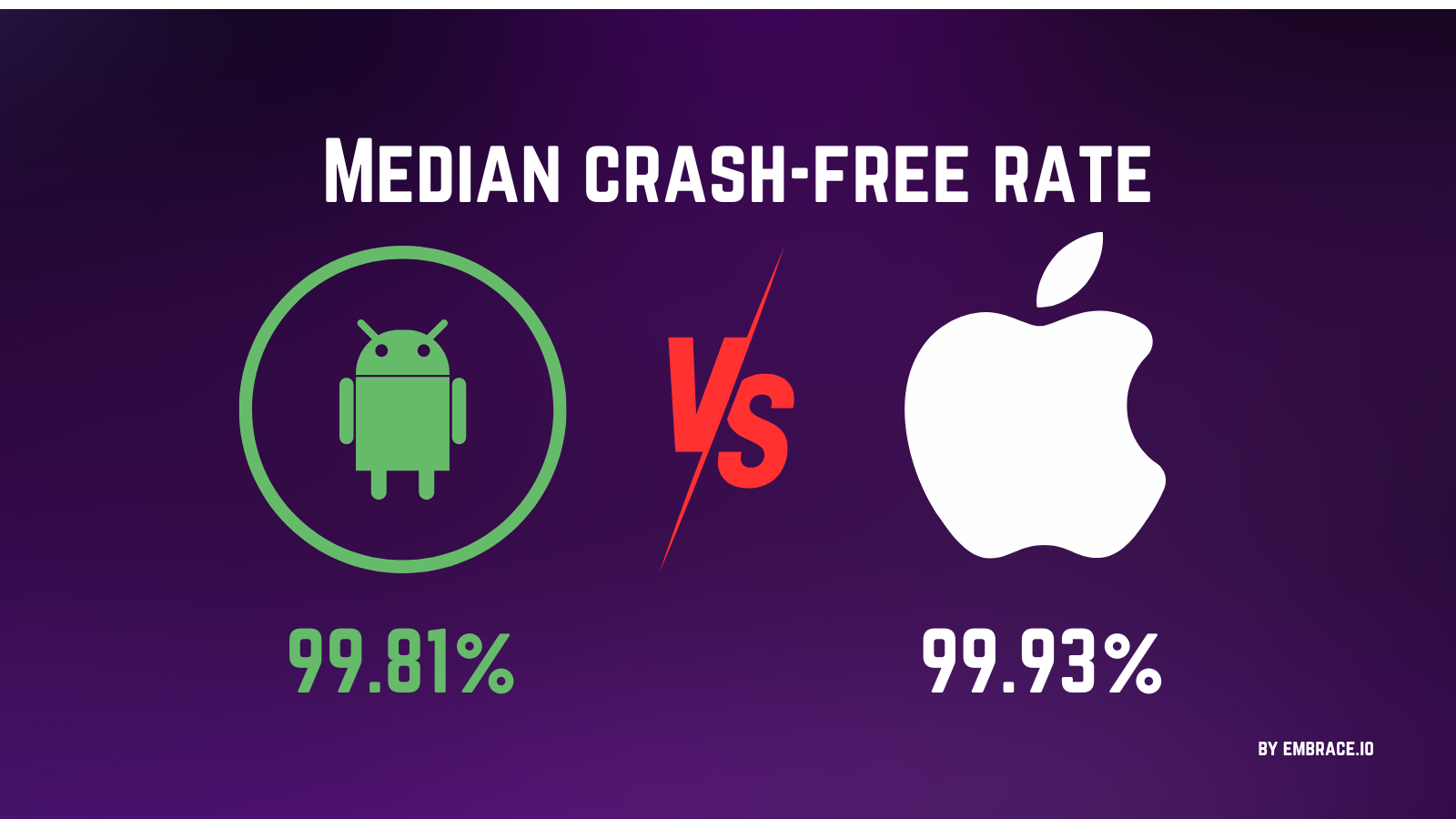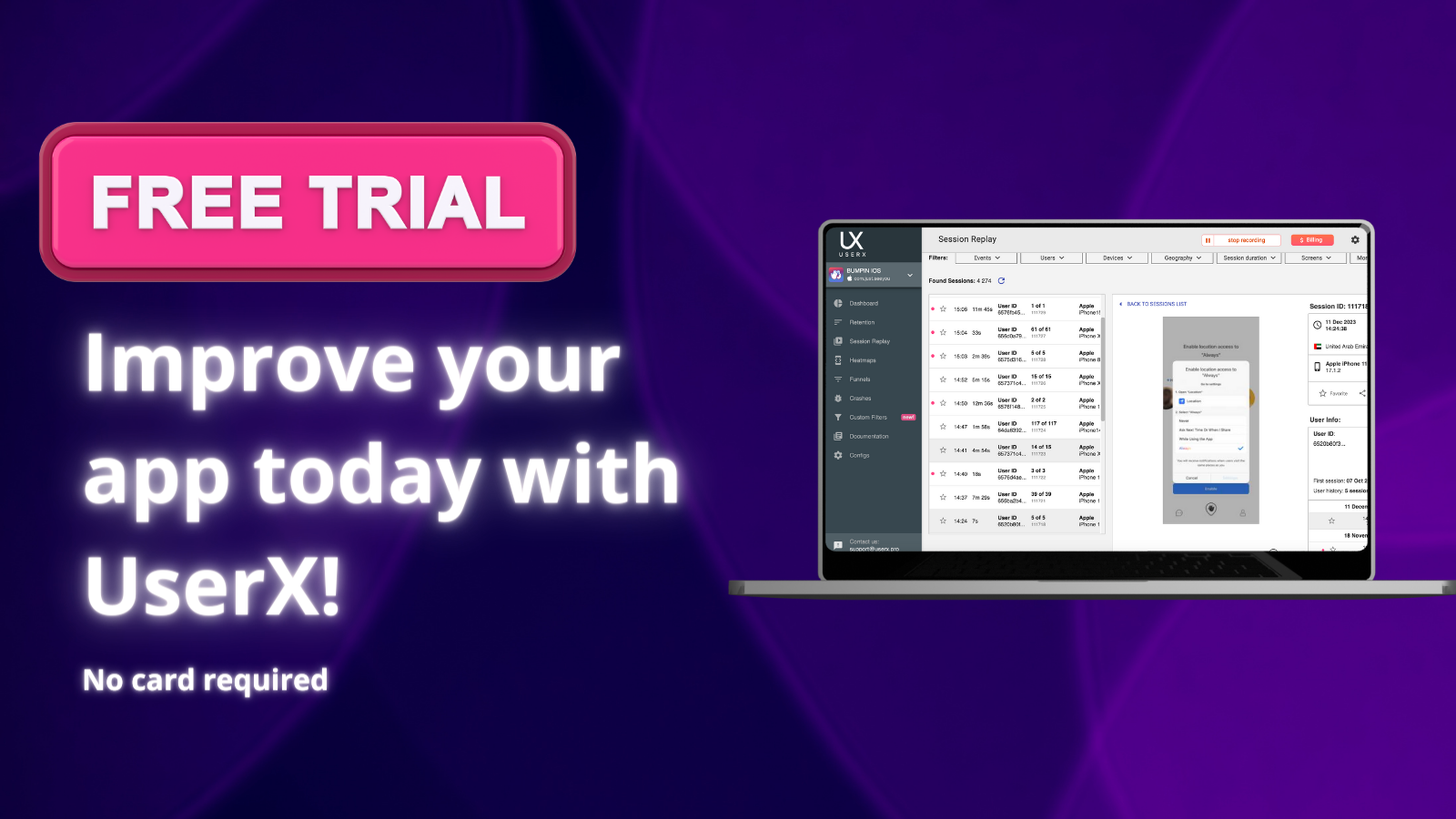Table of Comtents
Introduction
Today, when mobile apps dominate our daily interactions, the significance of app performance metrics cannot be overstated. These metrics serve as crucial indicators of an app's efficiency, responsiveness, and overall user satisfaction. But what exactly are app performance metrics, and why are they so vital for a seamless user experience?
At their core, app performance metrics encompass a range of data points — from application efficiency measurements to speed and responsiveness indicators. These metrics provide app developers and businesses with invaluable insights into how well their application is performing from a technical standpoint and, more importantly, how it's perceived by users. Whether it’s the speed at which an app loads, the smoothness of its operation, or the reliability of its features, each aspect measured by these metrics directly impacts the user’s interaction with the app.
In a landscape where user expectations are higher than ever, understanding and optimizing these performance metrics is not just a technical necessity; it's a vital component of user engagement and retention strategies. This introduction sets the stage to delve deeper into the world of app performance metrics, exploring their roles, impacts, and the transformative effects they have on the user experience.
Understanding App Performance Metrics
App performance metrics are the quantifiable indicators that provide insights into the functionality and effectiveness of a mobile application. These metrics are not just about measuring the technical aspects of an app but also about understanding how these aspects translate into user experience. So, what are the metrics that effectively measure app performance?
One of the primary metrics is mobile app speed metrics. This encompasses the response time of the app — how quickly it responds to user inputs. Speed is a critical factor in user satisfaction, as modern users expect quick and seamless interactions with their apps. Slow response times can lead to frustration and, ultimately, to users abandoning the app.
Another crucial set of metrics revolves around app load time statistics. This refers to the time it takes for an app to become fully operational after a user initiates it. In a world where every second counts, longer load times can be detrimental to user retention. Users often equate quick load times with efficiency and professionalism, making it a key metric for app developers to monitor and optimize.
In summary, understanding and measuring app performance through these metrics is essential. They are not just numbers; they are reflections of user experience and satisfaction. By focusing on mobile app speed and load time, developers can gain valuable insights into how their app is performing and where improvements are needed.
Related article: Crafting the Digital Odyssey: The Tapestry of Mobile App Metrics

Measuring Performance Effectively
Measuring the performance of an application effectively is a critical task for ensuring its success and user satisfaction. But how exactly is this measurement undertaken? To assess app performance comprehensively, developers utilize a variety of techniques and tools that fall under the umbrella of performance metrics for apps and mobile application usability metrics.
Techniques for Measuring App Performance:
- Benchmarking: This involves comparing your app’s performance against industry standards or competitors. Benchmarking helps in identifying areas where the app is lagging and areas where it excels.
- User Feedback: Direct feedback from users can be an invaluable source of information regarding app usability and performance issues.
- A/B Testing: This technique involves comparing two versions of an app to see which performs better in terms of user engagement, load times, and other performance metrics.
Tools Used for Performance Measurement:
- Analytics Platforms: Tools like Google Analytics for mobile provide detailed insights into user behavior, app traffic, and engagement levels. These platforms help in tracking key performance indicators (KPIs) and user interactions within the app.
- Performance Monitoring Software: Such software can track various aspects of app performance like load times, crash reports, and server response times. Tools like New Relic and AppDynamics are popular choices in this category.
- Usability Testing Tools: Tools like UserZoom or Lookback provide insights into how real users interact with the app, giving valuable feedback on usability aspects.
Incorporating these techniques and tools in the app development and maintenance process is essential for measuring and enhancing application performance. By focusing on both performance metrics for apps and mobile application usability metrics, developers can ensure that their app not only functions optimally but also provides a superior user experience.

Key Metrics for Performance Assessment
When assessing the performance of an application, selecting the right metrics is crucial for obtaining a meaningful understanding of its overall health and effectiveness. Among the plethora of metrics available, there are three key metrics that stand out in importance: App Load Time, User Engagement, and Crash Rate. Additionally, identifying the 'best' performance metric depends largely on the specific goals and context of the app.
App Load Time:
This metric measures the time taken for the app to load and become fully functional after being launched. It's a critical component of app stability measurements, as prolonged load times can lead to user frustration and app abandonment.
User Engagement:
This metric assesses how actively users are interacting with the app. It can be measured through session length, frequency of use, and the depth of interaction within the app. These indicators are vital in understanding the app’s impact on its users.
Crash Rate:
A key aspect of app stability measurements, the crash rate measures the frequency of app crashes. A high crash rate indicates stability issues, directly affecting user experience and app reliability.
Additionally, application runtime metrics play a pivotal role in performance assessment. These metrics provide insights into the efficiency of the app while it's running, including memory usage, CPU load, and other resource utilizations.
Selecting the right metrics for performance assessment involves a balance between technical indicators like load time and stability, and user-centric metrics like engagement. The best performance metric for an app will depend on its unique requirements and the specific aspects of performance that are most critical to its success. By focusing on these key metrics, developers can gain valuable insights into their app’s performance and areas that need improvement.
Understanding Mobile App Performance
Understanding mobile app performance involves more than just recognizing its functionality. It's about assessing the overall efficiency, reliability, and user satisfaction provided by an app. But how does this differ from general app performance, and what specific aspects should be considered?
Mobile app performance primarily focuses on the app's effectiveness in a mobile environment. This includes how well it operates on various devices, under different network conditions, and its adaptability to different screen sizes and operating systems. Key aspects include:
Mobile App Reliability Metrics:
These metrics are crucial for mobile apps. They measure the app's ability to perform consistently under various conditions. This includes stability, which refers to how often the app crashes or encounters errors, and responsiveness, which addresses how quickly the app reacts to user inputs.
User Experience:
In a mobile context, user experience goes beyond the interface and usability. It also encompasses aspects like battery usage, data consumption, and how the app impacts the overall performance of the device.
Adaptability:
Mobile apps must perform well across a range of devices and network conditions. This means efficiently using resources on less powerful devices and functioning smoothly in areas with low connectivity.
When evaluating mobile app performance, tools and features provided by platforms like UserX become invaluable. UserX can offer insights into app behavior through features like real-time performance monitoring and user interaction analysis. These tools help in pinpointing areas where the app might not be meeting performance standards, especially in a mobile context.
In summary, mobile app performance is about ensuring that the app not only functions as intended but also delivers a seamless, reliable, and efficient experience to users on their mobile devices. By focusing on mobile-specific metrics and utilizing advanced tools, developers can optimize their apps to meet the unique challenges of the mobile environment.
Leveraging UserX for App Performance Analytics
In the realm of optimizing app performance metrics, UserX emerges as a pivotal tool, offering a suite of features that can significantly enhance the way developers and analysts approach app performance analytics.
Session Recordings:
One of the standout features of UserX is its ability to record user sessions. This feature allows developers to observe user interactions in real time, providing a clear picture of how users are experiencing the app. Such insights are invaluable for identifying areas where the app's performance may be impacting the user experience negatively.
Heatmaps:
UserX's heatmaps provide a visual representation of user activity within the app, showing which areas are getting the most attention and interaction. This feature helps in understanding user behavior patterns and preferences, allowing for targeted performance improvements in the most crucial areas of the app.
Conversion Funnels:
By analyzing conversion funnels, UserX helps in identifying at which stages users are dropping off. This insight is crucial for pinpointing performance issues that might be causing user churn. Whether it's a slow loading time or a glitch in the transaction process, conversion funnels can reveal the performance bottlenecks that need to be addressed.
Crash Replays:
Another critical feature of UserX is its ability to provide crash replays. These replays are essential for quickly identifying and addressing technical errors that lead to app crashes, one of the most detrimental issues in terms of app performance and user experience.
Screen Flows:
Screen flows in UserX offer an overview of how users navigate through the app. This feature helps in understanding the user journey, allowing developers to optimize screen transitions and improve overall app performance and usability.
By integrating UserX into their app performance strategy, developers and analysts gain access to a comprehensive set of tools that not only help in measuring and analyzing app performance metrics but also in implementing actionable changes. This can lead to significant improvements in app efficiency, reliability, and overall user satisfaction.

Conclusion
The exploration of app performance metrics underscores their undeniable importance in enhancing user experience. In today’s digital-first world, where mobile apps are an integral part of daily life, ensuring optimal performance is not just a technical goal but a critical factor in user satisfaction and retention. App performance metrics, encompassing everything from load times to user engagement, serve as vital indicators of an app’s health and its ability to meet user expectations.
Looking to the future, we can anticipate significant advancements in the field of app performance analytics. The integration of more sophisticated AI and machine learning algorithms is expected to offer deeper, more predictive insights into user behavior. This will enable developers to anticipate user needs and address performance issues before they impact the user experience. Additionally, as user expectations continue to evolve, there will be a greater emphasis on personalized performance metrics — tailoring app experiences not just to broad user segments, but to individual preferences and behaviors.
Moreover, the growing importance of data privacy and security will likely influence how performance data is collected and analyzed. Developers will need to balance the need for comprehensive analytics with the user's right to privacy, leading to more innovative approaches to data collection and analysis.
In conclusion, app performance metrics are more than just numbers on a dashboard; they are a reflection of an app’s ability to deliver value and satisfaction to its users. As technology evolves, so too will the methods and tools for measuring and optimizing these metrics, paving the way for more responsive, user-centric, and successful mobile applications.
FAQ
What are App Performance Metrics?
App Performance Metrics are quantifiable indicators used to assess the functionality and efficiency of a mobile application. They include a range of data points like load times, user engagement, responsiveness, and stability of the app.
How do I measure the performance of an application?
The performance of an application can be measured using various tools and techniques such as benchmarking, user feedback, A/B testing, analytics platforms, performance monitoring software, and usability testing tools.
What are key metrics for assessing app performance?
Key metrics for assessing app performance include App Load Time, User Engagement, and Crash Rate. These metrics provide insights into the app’s efficiency, how engaging it is for users, and its overall stability.
How does mobile app performance differ from general app performance?
Mobile app performance focuses specifically on how an app operates in a mobile environment. It includes aspects like adaptability to different devices, performance under various network conditions, and how the app affects device resources like battery and data usage.
What features does UserX offer for App Performance Analytics?
UserX offers features such as session recordings, heatmaps, conversion funnels, crash replays, and screen flows. These features help in understanding user behavior, identifying performance issues, and optimizing the overall user experience.
What future trends are expected in App Performance Analytics?
Future trends in App Performance Analytics may include the integration of AI and machine learning for more predictive insights, a focus on personalized performance metrics, and innovative approaches to data privacy and security in analytics.
Why are App Performance Metrics important?
App Performance Metrics are crucial as they directly impact the user experience. Optimizing these metrics leads to higher user satisfaction, better engagement, and increased retention, which are vital for the success of any mobile application.



